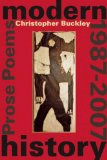 Review by Natasha Kochicheril Moni
Review by Natasha Kochicheril Moni
Tupelo Press
P.O. Box 539
Dorset, VT 0525
ISBN 978-1-932195-68-2
2008, 103 pp., $16.95
www.tupelopress.org
From light/humorous to contemplative/explorative to moments of poetic grace as in “I would have waited patiently/as always—like salt dissolving from the sea, like air gathering to be/somewhere else” (“Eternity,”16) to passages that ramble and collide, Christopher Buckley’s Modern History: Prose Poems 1987-2007 presents 41 poems of varied achievement.
With an introduction that cites Whitman and Duchamp and sings Buckley’s praises for four pages to the final poem that juxtaposes figures such as Doris Day, Aristotle and Modigliani, the reader is being guided to believe that these mentions are justified beyond their namesakes.
One would wish the best for a collection of poems, especially one by an author of such esteem from a highly regarded press. Buckley’s poems are accessible and at times offer hooks like, “Even on an island, anonymous as a wave” (“Ars Vita,” 32) or “I love a place as obvious as Paris” (“Paris Dispatch,” 57) or “The sky is anchored to your feet, the stands of eucalyptus moored/against midnight; it doesn’t look like anyone is going anywhere” (“The Sea Again,” 40). But they often convolute, leaving the reader to wonder how many of the details are salient, why the author believes (especially in a form such as the prose poem) that more prose equals better poetry.
Many of these pieces read as rants, so it is no wonder that there is the inclusion of a poem entitled “After a Reading, Charles Bukowski Returns & Gives Me the Lowdown on Fame, Mutability, the Afterlife et al. . .” (36):
Hell, I’ve gone five years and I’m still publishing more than you—
the books just keep coming like horses rounding the turn at Santa Anita. Life’s not fair—but death’s no nap in the park. Listen pal, I had a
huge backlog, one publisher and no awards—I didn’t gripe, and I never did drink as much as I used to.
Parceled in three sections, one may assume that each section relates to the time period in which the poems themselves were produced and/or the time period they reflect. The first section sets the stage with the author bringing his readers into the main character’s present day circumstances set against the backdrop of his childhood. A man at age 55 reflects on his school days, the concept of time itself. Modern History opens with “Eternity” and closes with “Doing the Math.” In between, there is a mixture of history—both the main character’s (what could be presumably the author’s history) and a snapshot of American history with the inclusion of figures such as Fats Domino and Robert Mitchum alongside places/experiences such as Woolworth’s, Lettermen’s Club and Nagasaki.
Sections two and three continue to explore a variety of topics, ranging from the Patriot Act to neutrinos to magnolias and eucalyptus, hummingbirds to ham and cheese and dieting:
I’ve dropped another 40 lbs.—another boat-load to go. Another platter of lettuce with vinegar on the side. I can eat eggs and all the animals I can get my hands on, my cholesterol shooting up like Southern California real-estate prices.
(“Conspiracy Theory: Low Carb Diet Conversion,” 45)
With the number of topics Buckley addresses not just throughout the book but within each poem, Modern History often reads as a list, streaming non sequiturs and name dropping in ways that don’t necessarily contribute to the meaning of the pieces themselves or the collection as a whole. It also requires the reader to do quite a bit of sifting to find the gems that are present within each poem, each section, the complete volume.
Perhaps of a demographic that cannot relate as well to Christopher Buckley and his encapsulated history, this reader recognizes that there is still value in his work and it may be appreciated with the proper lens. Raw and inquisitive, amusing and honest, Modern History: Prose Poems 1987-2007 will find a home with those who appreciate the Bukowskis of the world, as well as those who favor stream of consciousness.